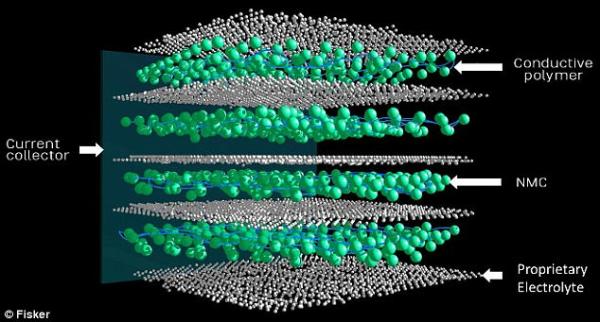Fisker applies for a patent for a solid-state battery: charge for 1 minute and endurance for 800 kilometers
Higher mileage, shorter charging time, and safer use... These are the goals pursued by major scientific research institutions and companies in the field of electric vehicles. Today, electric car maker Fisker is applying for a patent for a solid-state battery that will increase the cruising range of an electric car to 500 miles (approximately 805 kilometers) and reduce the charging time to one minute. The company plans to commercialize the battery by 2023.
Fisker was founded in 2005 and is based in California, USA, founded by former BMW designer Henrik Fisker. In February 2014, Fischer was included in the Chinese Premier Group and later changed its name to Karma.
According to the Daily Mail report on November 14, Fisker submitted a patent for a solid-state battery this week. The patent relates to new materials and manufacturing processes, which are very important for achieving the energy density, power, and cost targets needed for the battery and for promoting the promotion and application of electric vehicles.
Solid-state batteries are batteries that use solid electrodes and solid electrolytes. Most often used batteries are liquid batteries, and the electrolyte is mostly liquid. Since the solid-state battery has a relatively high power, it is an ideal battery for electric vehicles.
However, early studies have shown that solid-state batteries still have many limitations in commercial applications, such as low electrode current density, limited temperature range for use, limited available materials, high cost, and complex manufacturing processes. In addition, there are several failure modes that can affect the performance of solid-state batteries, including high contact resistance within the electrode layer structure, low ion mobility, etc., resulting in relatively low battery discharge capacity.

Patent schematic
Fisker said that their solid-state batteries use three-dimensional electrodes in an attempt to overcome the above challenges. The surface area of ​​this three-dimensional electrode is 25 times that of ordinary solid-state battery thin film electrodes, and has high electronic and ionic conductivity, enabling fast charging and low temperature operation.
Therefore, this solid battery has an energy density 2.5 times that of a normal lithium-ion battery. With the continuous advancement of materials and manufacturing levels, Fisco predicts that the cost of such batteries will be one-third that of conventional lithium-ion batteries by 2020. In addition, the risk of battery explosion is relatively low.
Fabio Albano, vice president of battery systems at Fisker, said: "This breakthrough marks the beginning of a new era of solid-state battery materials and manufacturing technology." He also said, "We are solving other obstacles to the solid-state battery commercialization. , such as the performance of a battery in a low temperature environment."
Fisker said that this battery will be exhibited at the International Consumer Electronics Show (CES) in January next year and is expected to be commercialized by 2023. Currently, the company is negotiating with potential non-automotive partners and it may be possible to commercialize this battery as early as 2023.
In fact, solid-state batteries are not entirely new research fields. Scientists have been researching this technology in the laboratory for many years. However, due to problems such as production costs and durability of the charging cycle, this product has not yet been applied.
In addition to Fisco, other companies and research institutes have also invested considerable attention in this R&D area. For example, Japan's NEDO (Japan's new energy industry technology development organization) formulated a research and development plan as early as 2008, and plans to achieve mass production of solid-state batteries in 2030, including solid metal lithium, solid lithium sulfur and solid-state lithium air battery, etc. . In July this year, Toyota Motor Corp. made new progress in patents for solid-state batteries and announced that it will launch a new electric vehicle equipped with all-solid-state batteries in 2022. German Volkswagen has also stated that it is already planning for the next generation of electric vehicle batteries. For solid-state batteries with a mileage of more than 1,000 kilometers, it will be mass-produced in 2025.
Material Flame Retardant Testing Equipment
Material Flame Retardant Testing Equipment,Compressed Air Aging Test,Air Aging Test,Vertical Flame Propagation Test
Guangdong Yuwei Instrument Equipment Manufacturing Co., Ltd , https://www.yuweiinstrument.com